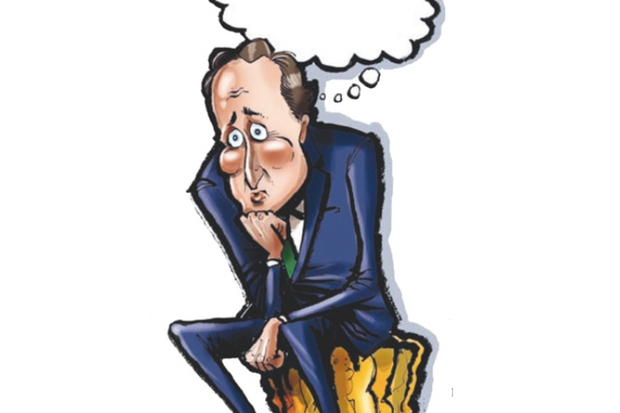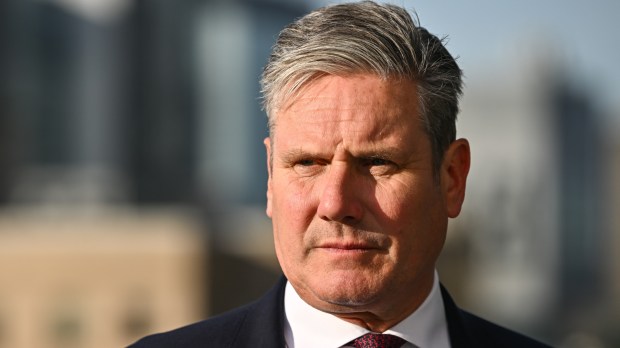Listen
In almost a decade as Conservative leader, David Cameron has tended to avoid talking about his political philosophy. He has presented himself as a pragmatist, suspicious of anything ending in ‘-ism’ — and the very opposite of a swivel-eyed ideologue. There is something to be said for this, but it raises the great question: what is a Conservative government for? There was no clear answer at the last election and so no clear result from that election. Voters had turned away from Labour, but were not quite sure how their lives would be better under the Conservatives.
No one can be in any doubt what Ed Miliband is offering in 2015. He comes out with policy after policy — each one easy to understand. Bills too high? Red Ed will tell companies to freeze them. Rent too high? Labour will call landlords to heel. He promises to tear up the old script which says that governments dare not interfere with the market. He’ll issue edicts to high street banks, money lenders and much more. You can argue (as we do) that this would lead to calamity, but at least Miliband can pose as an idealist in a parliament of cynics. He offers new thinking at a time when Britain is midway through a lost decade.
The next election should present the unhappy voter with a choice between two new ways of seeing Britain, but at present there’s only one radical vision — Labour’s. All the Conservatives have to offer a voter is some muttering about deficit reduction and a little managerial mumbo-jumbo. George Osborne, the Chancellor, tells James Forsyth on page 12 that elections are won from the centre. But even if you’re fighting from the centre, you still need a rallying cry; a vision of Britain that captures the imagination of voters. As Sir John Major can attest, economic recoveries do not speak for themselves — they need to be explained and articulated. For all his self-professed political skills, the Chancellor has failed in this regard.
It’s not that the Prime Minister and the Chancellor are in a bad position — far from it: they have the facts on their side. Where they have acted, they have been amply rewarded. The biggest single success has been in unemployment and the raising of the income tax threshold — though the net benefit is nowhere near the £600 per taxpayer per year claimed by the government. But in combination with the rigorous assessment of welfare claimants, raising the tax threshold means that tens of thousands are moving from welfare to work. At present, some 1,200 jobs are being created every day, which exceeds even the most optimistic forecasts. Let’s compare this success story with events in the countries where Ed Miliband’s ideas are being applied. One of them is France. François Hollande wanted to prove that spending is better than cutting and it has been an abject disaster. His ministers are having to eat their words, as Andrew Haldenby describes on page 16.
It would be almost amusing, if so many lives had not been affected by this disastrous misapplication of ideology — and if Britain were not being threatened with precisely the same experiment. The experience of public services in Wales, where Labour is still in power, shows that the same tragedy could easily happen here.
If it does, it won’t be because the left’s ideas have been badly implemented, but because they were wrong in the first place.The Prime Minister’s successes in government are not due to management theory but the proper application of Conservative principles. Consider the two Cabinet members who do talk about ideas, and convert them into action. If there is no demand for Michael Gove’s free schools, as Labour pretends, why are there three applications for every single place? If Iain Duncan Smith’s welfare reforms are cruel and ineffectual, why are there more people working now than at any point in British history?
Labour’s problem, as a government, was its failure to realise what it was doing wrong. The Tories’ problem is their failure to realise what they’re doing right.
At times, it seems as if Mr Cameron forgets his ministers’ great victories, and seeks only to be a good manager. Management is about doing things right; politics is about doing the right things, and the right things in this case mean placing trust in voters, taking power away from government and putting it back where it belongs. To extend Mr Osborne’s analogy, the Tories should promise to be the party of the radical centre — not keeping things as they are, but vastly accelerating the best reforms. It is encouraging that Osborne says a re-elected Tory government would go further on welfare and education reform. But more detail is needed.
Ed Miliband observed this week that he has ‘more intellectual self-confidence’ than Mr Cameron. He does, alas, have a point. Labour now has complete confidence in an agenda that wrecked Britain in the 1970s, is wrecking France now and threatens to wreck us again. Mr Cameron lacks confidence in an agenda which has achieved more than he seems to realise. Ideas matter in politics, and history is once again proving that Mr Cameron’s party has the best ones.
Hopefully, some time in the next year, he will say so.
Got something to add? Join the discussion and comment below.
Get 10 issues for just $10
Subscribe to The Spectator Australia today for the next 10 magazine issues, plus full online access, for just $10.
You might disagree with half of it, but you’ll enjoy reading all of it. Try your first month for free, then just $2 a week for the remainder of your first year.














Comments
Don't miss out
Join the conversation with other Spectator Australia readers. Subscribe to leave a comment.
SUBSCRIBEAlready a subscriber? Log in